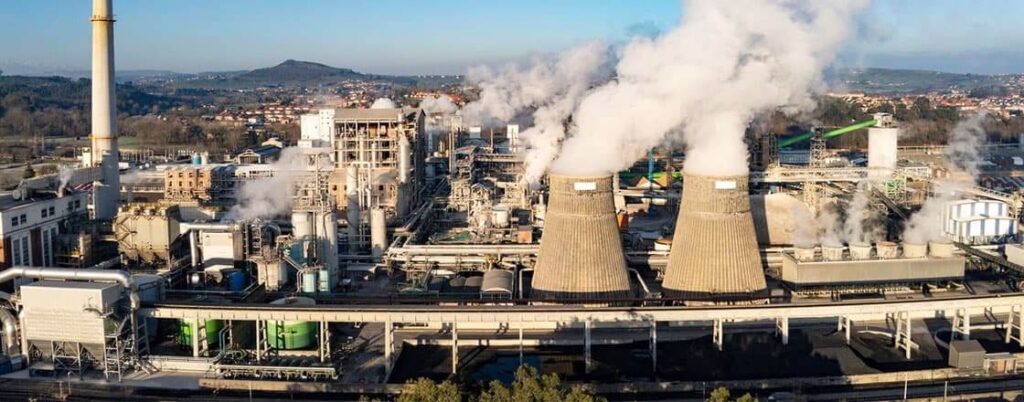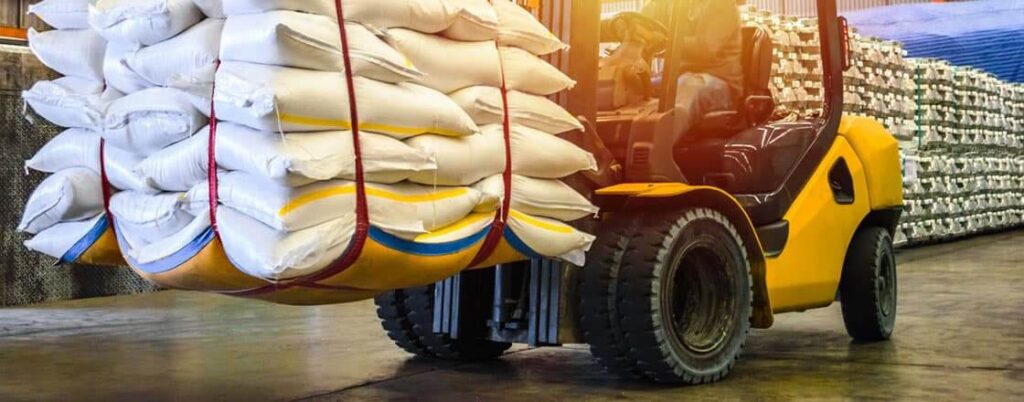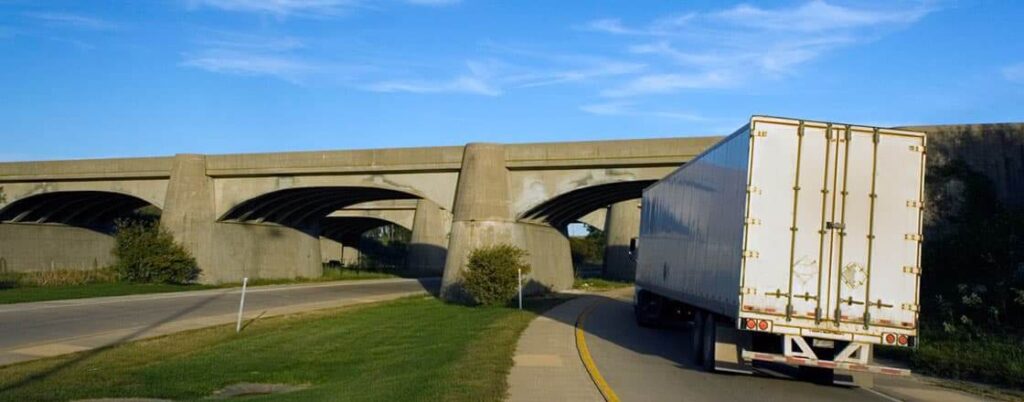Transloading soda ash is an essential service that shippers use when transporting the product. Regardless of where this essential product starts and ends its journey, it’s unlikely that the mode of transportation will stay the same. However, transloading soda ash isn’t as easy as it seems.
Soda ash is typically transloaded using a combination of bags secured to pallets, pneumonic trailers and either a dry bulk carrier or covered hopper car. Special care should be taken when handling sodium carbonate to avoid hazardous effects of inhalation or skin contact
We’ll provide you with all the detail on the safety procedures that should be followed when handling soda ash and how different ways the product is transloaded can affect cost.

Why Does Soda Ash Have To Be Transloaded?
There are a few reasons that soda ash (sometimes referred to as sodium carbonate) must undertake transloading services. For one, this important product is primarily produced domestically in Wyoming and California.
This means that when sodium carbonate is transported from one of these facilities, it will have to travel great distances to reach its destination. Oftentimes, sodium carbonate will start its journey by rail until it reaches a facility where it can be transloaded into a truck.
Despite being one of the lead manufacturers of sodium carbonate, the U.S. imports a considerable amount of the product from China. Since sodium carbonate travels overseas by boat, it has to be transloaded from ship to truck.

How Is Soda Ash Transported?
The way sodium carbonate is transported affects how the product is transloaded. This product can be transported in a variety of different ways. The table below shows what containers soda ash can be carried in, the type of vehicles that transport this product and how much each can carry.
| Container Or Vehicle | Amount In Pounds That Can Be Carried |
| Bag | 30 to 50 pounds |
| Dry Bulk Carrier | 15,000 to 35,000 DWT |
| Pneumatic Trailer | 80,000 pounds |
| Covered Hopper Car | 197,000 to 220,000 pounds |
| Box Car | 70 to 100 tons |
Typically, when sodium carbonate is transported by truck, it travels in bags that are secured to pallets. If an extremely large amount of sodium carbonate is transported by truck, a pneumatic trailer is used.
For rail shipments, a covered hop car carries the product. For ocean shipments, dry bulk carriers are used to carry sodium carbonate. Dry bulk cargo ships have what looks like giant cargo containers built into them. When opened, these superficial built-in containers run deep into the ship’s hull.
Regardless of what mode of transport is your soda ash load is changing to, Transload Services USA can be your strategic partner to get you the transload services that you need.


How Is Soda Ash Loaded and Unloaded From Truck and Rail Car?
Transloading requires unloading items from one mode of transportation and loading them onto another. Due to the various methods that sodium carbonate can travel, the method for loading and unloading can change based on the vehicles transporting it.
Loading and Unloading Soda Ash Without Bags
For occasions when sodium carbonate is not being transported within a bag, a pneumatic trailer will be used. Pneumatic trailers are top-loaded, meaning that any dry bulk materials will be loaded into each hopper from the top using a hopper system.
Unfortunately, unloading soda ash from a pneumatic trailer is a somewhat complicated process.
Each hopper on the pneumatic trailer is unloaded using an aerator which can be manipulated using control valves.
In an essence, aeration systems force the soda ash to the bottom of the hopper and into what is called the discharge line. This part of the trailer is at the bottom of the pneumatic trailer and is connected to each of the trailer's three hoppers. From the discharge line, the soda ash can be transloaded into a rail car.
When soda ash is transported by rail, it travels in covered hop cars. Similarly to pneumatic trailers, these cars have to be loaded from the top using a hopper system. When the car has been loaded, the airtight hatch at the top is resecured.
Covered hop cars use gravity to unload the products within them. The product will then fall into a pit or into a rail car discharge adapter (RCDA) that vacuums the product out. While pits provide a fast way of unloading products, an RCDA is the best tool to use for transloading sodium carbonate or any other type of dry bulk product.
The RCDA helps transfer the sodium carbonate into a pneumatic conveying system at a transload facility. This system vacuums out the material and stores it in a pot. From the pot, the soda ash can be transferred to a pneumatic trailer.
Loading and Unloading Soda Ash In Bags
Loading and unloading palletized soda ash bags is a pretty similar process regardless of whether you’re putting it into a box car or truck. These shipments will all be loaded and unloaded using a forklift.

Transloading Soda Ash: Factors That Affect Cost
Giving an exact amount on how much transloading soda ash will cost is difficult to do. Some of the factors that affect the price of transloading soda ash are the same factors that affect transloading prices for any other type of product. However, some factors are unique to transloading soda ash that can affect what you will end up paying.
The Difficulty Of Handling Soda Ash
One of the factors that has an impact on the cost of transloading sodium carbonate is the difficulty of handling the product itself. Like other types of dry bulk products, soda ash isn’t the easiest product to transload under most circumstances.
Dry bulk products like soda ash can aslo be vulnerable to the elements, which means that the product needs to be handled carefully. Another reason sodium carbonate needs to be handled carefully is due to the health hazards that it poses to people.
When handling this product, workers have to avoid these forms of exposure to soda ash:
- Inhalation
- Eye contact
- Skin contact
- Ingestion
Due to all of these unique features of soda ash, you’re going to have to send it to an actual transload facility for the loading and unloading procedures we already discussed to be carried out. Therefore, you should expect to pay more for transloading soda ash than other types of products.
Amount Of Product You Need To Transport
The amount of soda ash that you’re transporting is another factor that you’ll have to consider when you hire transload services. If you have a large shipment, that’s more soda ash that will have to be unloaded from its current mode of transport and loaded into the next mode of transport. More product means a longer transload time. As a result of these factors, you’ll have to pay more for your transload services.
Cost Of Fuel
Economic factors like the cost of fuel can impact transloading costs. The cost of diesel fuel is over $5 and $6 across every state. You also have to take into account the distance your shipment will travel. Longer distances mean more fuel to burn to get your product where it needs to go.

Amount Of Times the Shipment Is Transloaded
Some shipments might require transloading services only once. That said, you might find yourself on some occasions needing the service more than once. While you’ll have the option to do this, you’re going to have to pay for each time the product is transloaded. This will drive up your overall costs.
For more about transloading and its benefits, consult our article here.
Let Transload USA Help You With Your Transload and Cross Docking Services
If you need help finding transload services for your soda ash shipment, look no further than Transload USA. Along with years of experience, we have connections with some of the best distribution partners that can help you with the transload services you need.
Our full suite of services includes:
Fill out your quote today or call us at (352) 282-4588 to discover some other ways that we can help you.


